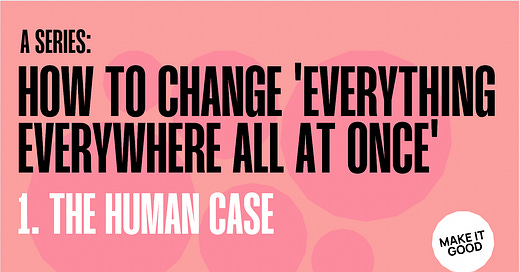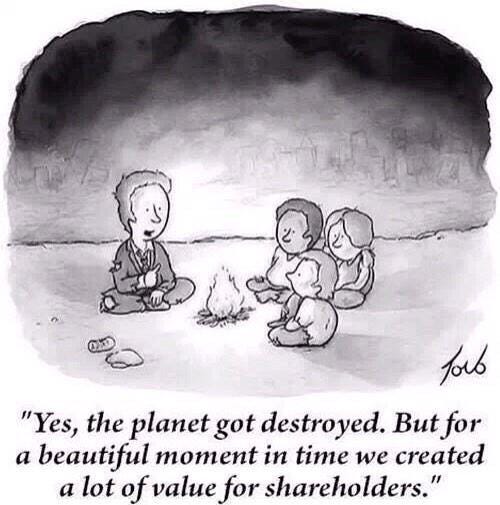INTRO : How To 'Change Everything Everywhere All At Once': A Series
Prologue: The Human Case For Change
Carbon is through the roof, biodiversity is on the floor. The planet is full of our stuff, full of our waste and the rivers are full of our shit. There’s a rubbish dump on Mount Everest, microplastics have been found in The Amazon River and there’s a pile of discarded clothes in the Chilean Desert so large it’s visible from space. People are at risk from both drowning and going thirsty, starvation, overeating, and overheating, and vast tracks of forest are either being cut down or going up in smoke. Dead fish and dolphins are washing up on beaches, en masse, all over the planet. Homeless or uber-landlords, people are either sad and poor, extremely rich and sad, or extremely rich and laughing all the way to the bank. Vast numbers in between are wringing their hands with anxiety over what to do, in denial and arguing with everyone else, or getting arrested for ‘being annoying’ about it. And it’s bloody hot outside. Everywhere. Yes, even the arctic. Climate change, we’re told, is out of control.
Humanity? It’s bad.
The worst bit? We did this.
We need to change “everything, everywhere, all at once” said Antonio Guterres back in April 2023 following the publication of IPPC AR6 III - an urgent, staggeringly simple, yet highly complex call to action, one that followed dire warnings the year before that humanity is facing a ‘collective suicide’ due to inaction.
This question has been niggling at me, like the answered facebook poke of old;
HOW do we ACTUALLY do that? Change everything, everywhere all at once? At an organisational level? Let’s say, from a standing start?
And what’s followed has been a bit of a personal journey into working out how to get change right. REALLY RIGHT. From the outset.
This I know. We can’t ‘change everything everywhere all at once’ doing everything the way we do it now.
What follows from today is a series to answer this question.
It’s part taking-a-position and part beginnings of a theory of change - the practical building blocks for getting change right, at pace, at an organisational level, to play a genuine role in the systemic changes we so genuinly need.
This prologue is provocation to frame what’s coming. So here goes:
Not Changing Is Not An Option: Building The Human Case Is Critical
“We are in the early stages of a sustainability revolution which bears the magnitude of the industrial revolution and the speed of the digital one" Al Gore, 2019.
The rationale for sustainable business transformation is often positioned in terms of risk, commercial opportunity, and corporate self-interest.
Businesses that don’t change now aren’t likely to survive. To crudely summarise the World Economic Forum's 2023 Global Risk Report, "what you don't address today, is just going to come back and bite us in the arse down the track.” And much sooner than any of us realised, even the scientists.
The Business Sustainability Management course at The Cambridge Institute For Sustainability Leadership anchors ‘Rewiring the Economy’ in terms of risk and opportunity. Our task, as course participants, is to build the business case. I’ve written about this before in the context of circularity, as have countless others. And I’m writing it again now only to challenge it as the primary motivator for change.
Because to look at business transformation solely through the lenses of ‘risk and opportunity’ is to dehumanise this moment and indeed the people part of it.
This is an existential 'do or die' moment for humanity and all living things. Yes, businesses, as part of a global geopolitical and economic system that got us to this moment, are in prime position to help regenerate a breaking planet and society. And yes, isn’t that a wonderful, inspiring commercial opportunity for business leaders to respond to?
But in all that, let’s not forget the human case.
We are humans. Human beings part of the biosphere who have heartbeats in our chests and live and breathe the air and dance and cook and eat and walk and were fish once (I think). Humans who were born babies and maybe went on to have babies too and if not befriended other babies who had become grown up humans. Fathers, mothers, brothers, sisters, wives, husbands, daughters, sons. Cousins. Friends. Neighbours. That bloke on the train eating a sandwich. They all got to grow and walk on sand and drink the clean water, dive into the sea, put their faces to the sun to soak up the warmth and MARVEL. To live. Think of the friends pregnant now, or babies due, and those freshly birthed the world over. What are we, standing here, if we choose to ‘eat their future’ instead of fix it?
Somewhere along the way, ‘doing the right thing’ in a business context has become synonymous with sentimentality. Not commercial enough. Naive. “Fluffy”, I heard in a meeting recently.
You don’t need me to tell you that things are bad out there right now. We also know, categorically, that a significant number of businesses depend on human exploitation and environmental destruction to sustain themselves.
And yet, in an absurd example of twisted morality as we confront the human extinction of our own making in The Anthropocene, those leading sustainable transformation to try and fix it must ‘sell it in’.
Sustainability leads, the exhausted righteous, antiheroes answerable to CSR, become contortionists of truth finding a version of ‘‘doing the right thing’ that senior management will buy into. What’s the business case for not poisoning the waterways human beings depend on? What’s the business case for not allowing plastics to enter the food and water chain? What’s the business case for not causing harm to women and children in factories? What’s the business case for not making things we know WILL end up in a rubbish dump because we haven’t worked out an end of life solution? What’s the business case for not wasting food in increasingly volatile markets as millions go hungry? We must show, with data, that they will lose their social license to operate, hold up the emerging regulation whilst watching as they turn their faces from the true human and ecological cost of their business models.
Where’s the humanity in that?
Not changing is no longer an option. YES OF COURSE build the business case. Change needs to be financed and emergent models need to turn a profit to do good in the world. YES, lean into the shiny new opportunities - therein lies HOPE and optimism which is like golden nectar to keep us going.
But the human case for change needs to sit tightly nested alongside it - our moral compass with a guiding north star to keep reminding ourselves of what we are and why we’re doing it.
Because we, too, are human. And of nature.
"Once our personal connection to what is wrong becomes clear, then we have to choose: we can go on as before, recognizing our dishonesty and living with it the best we can, or we can begin the effort the change the way we think and live." Wendell Berry.
The next chapter in this series is now live - it’s all about how to place yourself in this moment of change.






